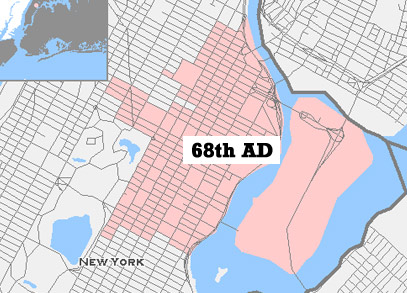6th Annual Karaoke with Krueger
Tuesday, December 1st, from 6-8pm
Iggy’s
1452 2nd Avenue (between 75th & 76th Streets)
Tickets start at $25!
LaborPress Leadership Awareds Reception
Tuesday, Dec 1, 2015
5pm-8pm
NYC District Council of Carpenters, 10th Fl.
395 Hudson St. New York, NY 10004
Councilmember Dan Garodnick Cocktail Reception
6:00-7:30 PM
The Folly
92 West Houston Street
Cost – $250
Email: mgiaccio@bedfordgrovellc.com
Designing Better Affordable Housing
Panel Discussion
Co-Sponsored By VID
Tuesday, December 1, 2015 6:30 PM
Museum of the City of New York
105 Street and Fifth Avenue
FFDC December Nomination Meeting
Wednesday, December 2nd, at 7pm
Church of the Holy Trinity Choir Room
341 East 87th Street (Between 1st & 2nd Aves)
Judicial Induction of Arthur F. Engoron
Thursday, 3rd December, 2015,
4:30 p.m.
111 Centre Str.
Three Parks Independent Democrats Holiday Party
212-539-7602
Sunday, December 6 from 5:00 PM to 8:00 PM
The Youth Hostel, Ballroom 891 Amsterdam Ave @103rd St New York, NY 10025
Uptown Community Free Democrats
General Meeting is Dec 6th 3 to 5p
CRDC Holiday Party
December 6
4 – 7:00P.M. Hudson Guild Elliott Center
LHDC Holiday Party
December 8, 2015
The East Wing
7:00 to 10:00 pm.
CoDA – Coalition for a District Alternative Holiday Party
Tuesday, December 8th from 6:30-10:30pm
Revision Lounge, 219 Avenue B between E 13th and E 14th Streets
For more information email: codalesinfo@gmail.com
FFDC Holiday Party!
Wednesday, December 9th, at 7pm
The East Wing
306 East 76th Street (between 1st & 2nd Aves)
RSVP on Facebook – Free appetizers and cocktails!
Assemblymember Linda B. Rosenthal Holiday Party
Wednesday, December 9, 2015 • 6:00 – 8:00 p.m.
Hargrave House
111 West 71st Street (between Amsterdam & Columbus Avenues)
Refreshments Will Be Served
RSVP: 212-873-6368 or rosenthall@assembly.state.ny.us
Judicial Induction of Tanya Renee Kennedy
Thursday, 10th December, 2015
4:30 p.m., 60 Centre Str.
Judicial Induction of Lisa Susan Headley
Friday, 11th December, 2015
5:30 p.m.
Poet’s Den & Gallery, 309 East 108th St., betw. 1st & 2nd Aves.
NARAL Holiday Party
December 9th
Juke Bar in the East Village
7-9PM
Ticket are $15 and include one complimentary drink ticket. Happy hour specials will run all night ($5 beer, wine, and well drinks). Click here to purchase your ticket in advance!
Tenants Clinic
Wednesday, December 9, 2015
26 Perry Street
6:00 PM
VID Holiday Party
Frieda Bradlow’s Home
Sunday, December 13, 2015
43 Charlton Street 2-5 PM
Donations of food and beverages
Email Nancy what you will bring at nancyshamban@gmail.com
Gramercy Stuyvesant Ind. Dems Holiday Party
Sunday Dec. 13 th 2015
6:30PM-9:30PM
Mumbles Restaurant, East 17th Street and 3rd Ave
Members free, Guests- $35.00
RSVP- Marcia Goldstein 212-475-5755
Uptown Community Free Democrats
Holiday Party is Dec 13th 4-6:30
Location TBA
WRAP A HOLIDAY TOY FOR TOT’s Drive
November 13 – December 13
Drop off Centers
Your Local Precinct Community Affairs Office
3333 Broadway Tenant Association Room
Contact: Alicia Barksdale at cecejaz@gmail.com or call (917) 892-9197
Rep. Carolyn Maloney & Assemblyman Dan Quart’s Annual Holiday Party
Monday, December 14th, from 6-7:30pm
PS 527 (East Side School for Social Action)
323 East 91st Street (between 1st & 2nd Aves)
Free!
Lexington Democratic Club Holiday Party
Tuesday December 15, 2015
6:30-8:30PM
Location TBA
Cost: unwrapped toy for charity
lexingtonclub@gmail.com
Frederick E. Samuel Community Democratic Club
Harlem YMCA Annex, 181 W 135th St between Malcolm X. Blvd and Adam Clayton Powell, Jr. Blvd. (Lenox and 7th Ave). For more details please see the image of the flier.
Eleanor Roosevelt Democratic Club,
SAVE THE DATE: THURS, DEC 17
Judicial Induction of Raymond L. Bruce
Thursday, 17th December, 2015
4:30 p.m.,
111 Centre Str.
Democratic Candidates Debates
Saturday, December 19, 2015 on ABC
Tenants Clinic
Wednesday, December 23, 2015
26 Perry Street
6:00 PM
VID Executive Committee Meeting
Monday, December 28, 2015
26 Perry Street
6:30 PM
General Membership Meeting
Thursday, January 14, 2016
St. John’s Lutheran Church Annex
83 Christopher Street
6:30 PM
Judicial Induction of Arlene P. Bluth
Thursday, 7th January, 2016
4:30 p.m.,
111 Centre Str.
Judicial Induction of Lyle Frank
Thursday, 14th January, 2016
4:30 p.m.,
111 Centre Str.
Democratic Candidates Debates
Saturday, January 17, 2016 on NBC






